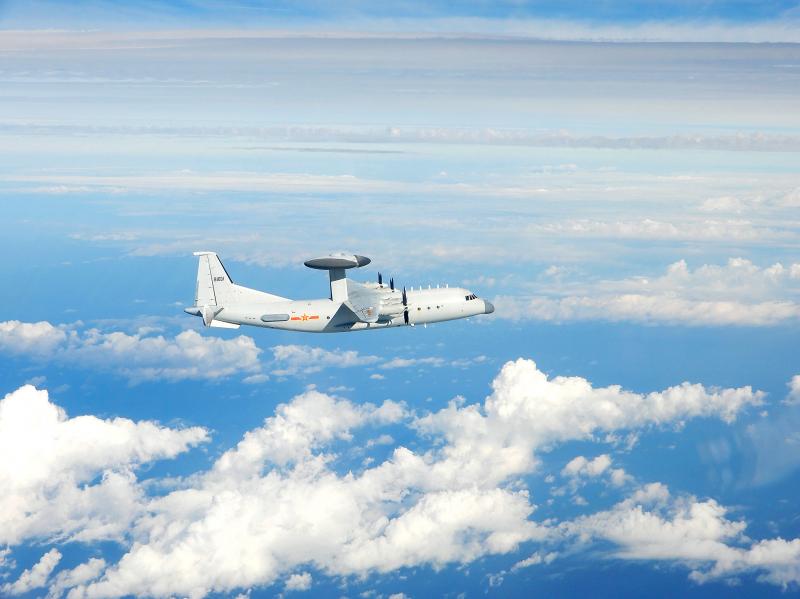Beijing’s two largest air sorties into Taiwan’s southwest air defense identification zone (ADIZ) last month were more directed at the new administration of US President Joe Biden than Taiwan, an analyst said.
Institute for National Defense and Security Research assistant research fellow Jeremy Hung (洪子傑) made the comments in a research paper published on the institute’s Web site on Wednesday.
Last year, the Chinese People’s Liberation Army (PLA) sent aircraft into the airspace between Taiwan and the Pratas Islands (Dongsha Islands, 東沙群島) in the South China Sea on at least 100 days, the Ministry of National Defense said.

Photo courtesy of the Ministry of National Defense
Taiwan considers the airspace above strategic waters connecting the Taiwan Strait and the Bashi Channel to the South China Sea part of its ADIZ.
Chinese military planes flew into the zone 26 out of the first 30 days of this year, ministry records showed.
However, the two largest intrusions came on Jan. 23 and 24, when the PLA sent 13 and 15 military planes, including bombers and fighter jets, respectively, into the area.
The ministry began publicizing the Chinese incursions in mid-September last year.
Hung said the two largest incursions came shortly after Biden took office
The mode of “harassment” differed from previous intrusions, when the PLA mostly deployed one or two low-speed spy planes, which are not considered as provocative as fighter jets, Hung said.
However, the two incursions last month were “less intimidating,” as they took place in airspace southwest of Taiwan rather than in the middle of the Taiwan Strait, he added.
The PLA has previously sent aircraft across the median line of the Strait, such as when Beijing believes developments involving Taiwan breach its “one China” principle, he said.
The two incidents last month were Beijing’s response to Washington inviting Representative to the US Hsiao Bi-khim (蕭美琴) to Biden’s inauguration, and a Jan. 23 statement by the US Department of State urging China to stop intimidating Taiwan, Hung said.
Although the two incidents can still be viewed as part of Beijing’s continued coercion of Taiwan, sending a message to the Biden administration, as well as proving PLA training, might be Beijing’s main objectives, he said.
From a political viewpoint, Beijing might want to pressure the new US government into bilateral dialogue, he said.
From a military perspective, the PLA might also want to test and hone its combat skills, as the USS Theodore Roosevelt and its battle group transited the Bashi Channel into the South China Sea on Jan. 23, he added.
Intrusions by warplanes are a “double-edged sword,” Huang said.
While Beijing moves to increase its military presence in the region, such action gives the US legitimate reasons to sell arms to Taiwan, he added.

Taiwan is stepping up plans to create self-sufficient supply chains for combat drones and increase foreign orders from the US to counter China’s numerical superiority, a defense official said on Saturday. Commenting on condition of anonymity, the official said the nation’s armed forces are in agreement with US Admiral Samuel Paparo’s assessment that Taiwan’s military must be prepared to turn the nation’s waters into a “hellscape” for the Chinese People’s Liberation Army (PLA). Paparo, the commander of the US Indo-Pacific Command, reiterated the concept during a Congressional hearing in Washington on Wednesday. He first coined the term in a security conference last

Prosecutors today declined to say who was questioned regarding alleged forgery on petitions to recall Democratic Progressive Party (DPP) legislators, after Chinese-language media earlier reported that members of the Chinese Nationalist Party (KMT) Youth League were brought in for questioning. The Ministry of Justice Investigation Bureau confirmed that two people had been questioned, but did not disclose any further information about the ongoing investigation. KMT Youth League members Lee Hsiao-liang (李孝亮) and Liu Szu-yin (劉思吟) — who are leading the effort to recall DPP caucus chief executive Rosalia Wu (吳思瑤) and Legislator Wu Pei-yi (吳沛憶) — both posted on Facebook saying: “I

The Ministry of Economic Affairs has fined Taobao NT$1.2 million (US$36,912) for advertisements that exceed its approved business scope, requiring the Chinese e-commerce platform to make corrections in the first half of this year or its license may be revoked. Lawmakers have called for stricter enforcement of Chinese e-commerce platforms and measures to prevent China from laundering its goods through Taiwan in response to US President Donald Trump’s heavy tariffs on China. The Legislative Yuan’s Finance Committee met today to discuss policies to prevent China from dumping goods in Taiwan, inviting government agencies to report. Democratic Progressive Party Legislator Kuo Kuo-wen (郭國文) said

The Ministry of Economic Affairs has fined Taobao NT$1.2 million (US$36,900) for advertisements that exceeded its approved business scope and ordered the Chinese e-commerce platform to make corrections in the first half of this year or its license would be revoked. Lawmakers have called for stricter supervision of Chinese e-commerce platforms and more stringent measures to prevent China from laundering its goods through Taiwan as US President Donald Trump’s administration cracks down on origin laundering. The legislature’s Finance Committee yesterday met to discuss policies to prevent China from dumping goods in Taiwan, inviting government agencies to report on the matter. Democratic Progressive Party